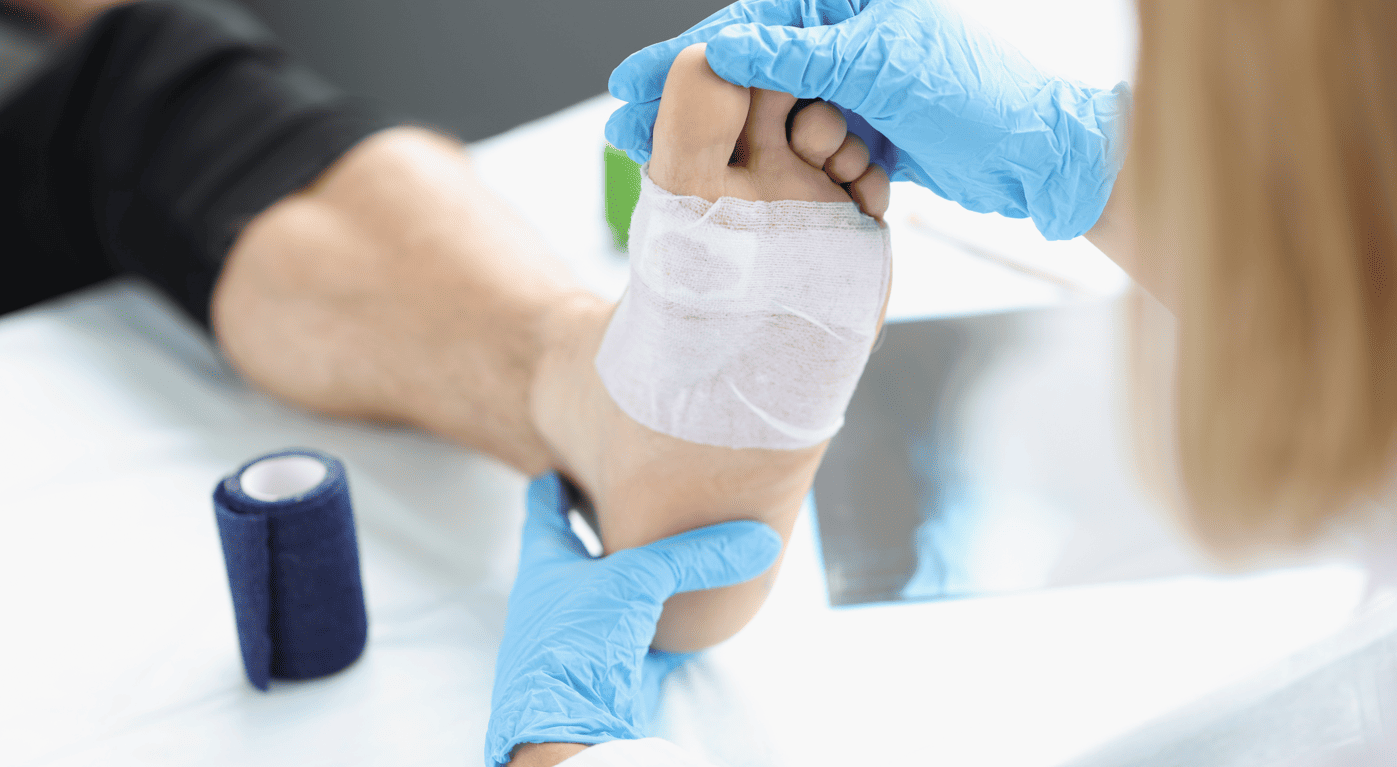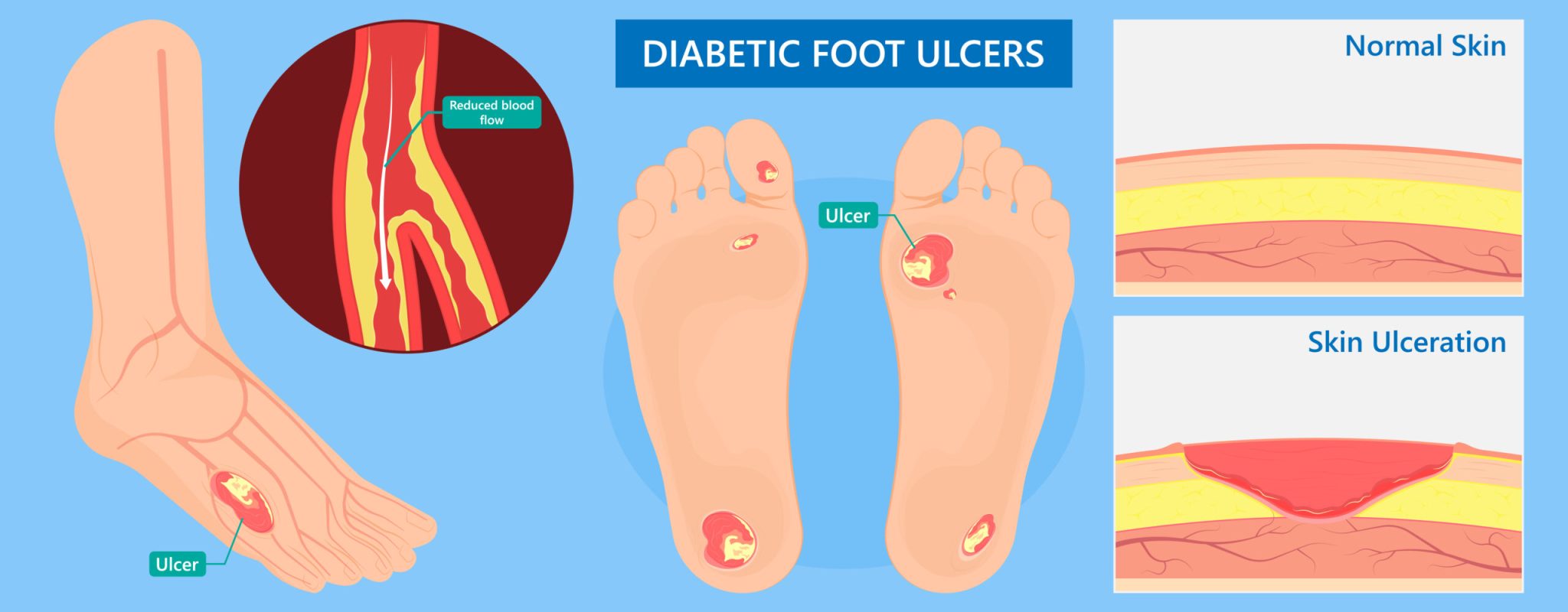Stem Cell Research for the Treatment of Diabetic Foot Ulcers

What is a Diabetic Foot Ulcer?
A diabetic foot ulcer (DFU) is a common complication in patients with diabetes. It is an open sore or wound on the skin that heals slowly, significantly impacting morbidity, mortality, and the quality of life of those affected.
High blood sugar levels from diabetes can cause nerve and blood vessel damage over time, leading to reduced blood flow to the feet. This decrease in circulation limits the supply of cells that combat infection, prolonging the wound-healing process.
Even minor injuries or burns can lead to ulcers and infections. If a wound becomes infected due to slow healing, there is a high risk of progressive tissue death. In such cases, patients may require surgery to remove the damaged tissue, and in severe instances, amputation of toes or the foot may be necessary.
Reference:
Senneville É, Lipsky BA, Abbas ZG, et al. Diagnosis of Infection in the Foot in Diabetes: A Systematic Review. Diabetes/Metabolism Research and Reviews. 2020;36(S1).

Facts About Diabetic Foot Ulcers
- There are 415 million people worldwide living with diabetes.
- 10% of diabetes patients develop diabetic foot ulcers.
- 46% of diabetes cases remain undiagnosed, and it is estimated that by 2040, the global number of diabetes patients will reach 642 million.
- The number of diagnosed diabetes cases has doubled over the past 20 years.
Reference:
Senneville É, Lipsky BA, Abbas ZG, et al. Diagnosis of Infection in the Foot in Diabetes: A Systematic Review. Diabetes/Metabolism Research and Reviews. 2020;36(S1).
Stages of Diabetic Foot Ulcers

Stage 1
The foot ulcer begins to show signs of swelling, redness, or irritation without any secondary infection. The skin remains intact but may have small cracks or abrasions.
Stage 2
The ulcer deepens into the underlying layers of the skin and may become infected. The wound enlarges and may exhibit pus or increased swelling.
Stage 3
The ulcer extends to the muscle layer and starts developing necrotic tissue (dead tissue) due to severe blood flow restriction. Infection may spread to the bones and other nearby tissues.
Stage 4
The diabetic foot ulcer shows severe infection, with significant tissue necrosis in the surrounding area. The infection may spread to the bones, and amputation of the affected area might be necessary to prevent further infection.
Stage 5
In cases of advanced ulceration and severe infection, amputation of the foot or the damaged part may be required to reduce the risk of life-threatening infections.
Diabetic Foot Ulcers (DFU) are chronic wounds that are difficult to heal, leading to a high rate of amputations among diabetic patients.
Reference:
Senneville É, Lipsky BA, Abbas ZG, et al. Diagnosis of Infection in the Foot in Diabetes: A Systematic Review. Diabetes/Metabolism Research and Reviews. 2020;36(S1).
Stem Cell Therapy for Treating Diabetic Foot Ulcers (DFU)
- Stem Cell have the ability to secrete cytokines or growth factors that stimulate healing and possess cell differentiation capabilities, making them a promising regenerative approach for treating wounds in DFU patients.
- Mesenchymal Stem Cell (MSCs) have the potential to regenerate, replace, or repair damaged tissues by differentiating into functional cells and integrating with injured tissues.
- Stem Cell with these properties can mobilize and direct the body’s own Stem Cell to damaged tissue areas.
- Stem Cell accelerate the wound healing process by regulating the immune system and producing growth factors that promote neovascularization, reepithelialization, angiogenesis, and wound closure.
Stem Cell therapy has been used as an adjunct treatment for diabetic foot ulcers, with the potential to expedite wound healing, reduce infections, and prevent new ulcers from forming. This therapy offers a life-saving, non-surgical option for diabetic patients.
Reference:
Zhang HM, Yang ML, Xi JZ, Yang GY, Wu QN. Mesenchymal Stem Cells-Based Drug Delivery Systems for Diabetic Foot Ulcer: A Review. World Journal of Diabetes. 2023;14(11):1585-1602.
Get in touch with our specialist
Location
Photalai Golf Park Building, 4th Floor, Room B401 28/2 Soi Klong Lam Chiek School, Khlong Chan Subdistrict, Bang Kapi District, Bangkok 10240
Our hours
9:00 AM – 18.00 PM
Tuesdays – Sundays (closed on Mondays)
Contact us
Phone: (66) 2-508-5100
Email: info@novavida.co.th


